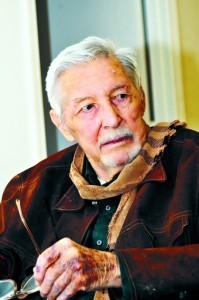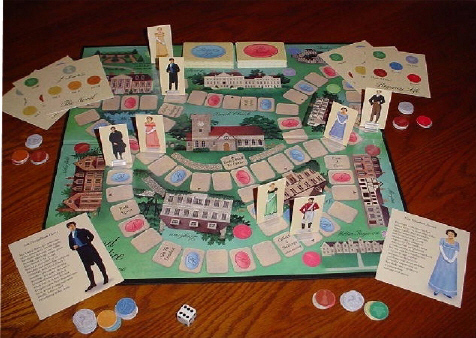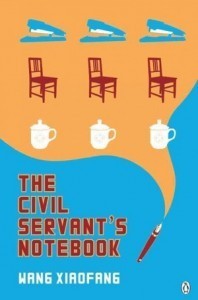The Paris Review's Blog, page 856
January 14, 2013
Thunder Stick
 It came in a box. A big box, with two or three others. Sam had finally cleaned house.
It came in a box. A big box, with two or three others. Sam had finally cleaned house.
It’s not every day you get a box of tennis racquets in the mail. I ripped it open and immediately shook hands with each one.
“Now guys, shake hands with the racquet.” If I’d said that once I’d said it, I don’t know, maybe twenty-five times. Once for each tennis clinic I’d taught for little kids over high school summers. Kids who’d devised a game called Hit the Ball at the Teacher, which they’d passed on to their younger brothers and sisters, the little buggers.
There was a Yonex in the box that felt cold and distant—the shake of a bureaucrat. There was another I’ve since given away that felt insubstantial—the absent shake of someone scanning the room for more important hands. And then there was the Prince. I swear to you, the Prince’s handle still felt warm.
The grip was slightly sticky—as a good grip should be—and worn where my right index finger curled up the beveled edge of the shaft. It filled my palm easily and comfortably: the racquet’s way of looking me straight in the eye as our hands met. This was Emma’s racquet.
The frame was a little slick for my tastes. Shiny black, with an aqua-blue and pink blaze up both sides of the head that looked like rain blotches on a Doppler weather map. And it was called Thunder Stick. There was a lightning bolt through the diagonal slash of the n in Thunder.
“Lord, did Emma know that?” I wondered. Not her style. And there was another message from the manufacturer along the inside rim: “Sweet Spot Suspension.” If that were true, I figured it was okay that it looked a little cheesy and was called Thunder Stick.
I fingered the strings and saw they were worn, with little bits of neon-yellow fuzz stuck at the junctions where the vertical and horizontal rows overlapped. Evidence that this racquet was not new. Evidence that Emma had hit with it.
A Truth Universally Acknowledged
In honor of the two hundredth anniversary of Pride and Prejudice, one might do many things: reread the classic 1813 comedy of manners, watch one of the many adaptations, engage in a little country dancing. May we suggest a genteel round of Pride and Prejudice: The Board Game? Play Darcy or Elizabeth, deal with misunderstandings and cads, travel from Longbourne to Pemberley. The goal, of course, is to end with a wedding.
“Altar”-Shaped
A send-up of George Herbert’s famous seventeenth-century shape poem “The Altar,” featuring my own conflicted version of devotion.
Jason Novak works at a grocery store in Berkeley, California, and changes diapers in his spare time.
Bookless Libraries, and Other News
Meet the bookless library, if you dare.
If that fills you with fear, here is a beautiful antique barn filled with books.
A Murakami calendar? There is indeed an app for that.
A tribute to Aaron Swartz.
January 11, 2013
The Beau Monde of Mrs. Bridge
Our great contributor Evan Connell died this week. His best-loved novel, Mrs. Bridge, began as a short story in the Fall 1955 issue of The Paris Review. See below for the full text.
PARKING
The black Lincoln that Mr. Bridge gave her on her forty-seventh birthday was a size too long and she drove it as cautiously as she might have driven a locomotive. People were always blowing their horns at her or turning their heads to stare when they went by. The Lincoln was set to idle too slowly and in consequence the engine sometimes died when she pulled up at an intersection, but as her husband never used the Lincoln and she herself assumed it was just one of those things about automobiles, the idling speed was never adjusted. Often she would delay a line of cars while she pressed the starter button either too long or not long enough. Knowing she was not expert she was always quite apologetic when something unfortunate happened, and did her best to keep out of everyone’s way. She changed into second gear at the beginning of any hill and let herself down the far side much more slowly than necessary.
Usually she parked in a downtown garage where Mr. Bridge rented a stall for her. She had only to honk at the enormous doors, which would then trundle open, and coast on inside where an attendant would greet her by name, help her out, and then park the formidable machine. But in the country club district she parked on the street, and if there were diagonal stripes she did very well, but if parking was parallel she had trouble judging her distance from the curb and would have to get out and walk around to look, then get back in and try again. The Lincoln’s seat was so soft and Mrs. Bridge so short that she had to sit very erect in order to see what was happening ahead of her. She drove with arms thrust forward and gloved hands tightly on the large wheel, her feet just able to depress the pedals all the way. She never had serious accidents but was often seen here and there being talked to by patrolmen. These patrolmen never did anything partly because they saw immediately that it would not do to arrest her, and partly because they could tell she was trying to do everything the way it should be done. When parking on the street it embarrassed her to have people watch, yet there always seemed to be someone at the bus stop or lounging in a doorway with nothing to do but stare while she struggled with the wheel and started jerkily backward. Sometimes, however, there would be a nice man who, seeing her difficulty, would come around and tip his hat and ask if he might help.Read More »
What We’re Loving: Saintly Comics, High Relief
 In 1974, David Esterly was pursuing a career as an academic when he encountered a limewood carving by the seventeenth-century master Grinling Gibbons. He gave up English literature, devoted himself to the art of high-relief carving, and in the process became not merely the foremost Gribbons expert, but a master carver himself. The Lost Carving: A Journey to the Heart of Making details Esterly’s restoration of a Gribbons drop at Hampton Court, but it is more than this. “I was apprenticed to a phantom, and lived among mysteries,” he writes of that time, and the memoir is indeed as much about engagement with the past, and the preservation of ancient arts, as it is one man’s journey. If you are in New York, through January 18, you can see Esterly’s intricate and beautiful work on display at W. M. Brady and Co. —Sadie Stein
In 1974, David Esterly was pursuing a career as an academic when he encountered a limewood carving by the seventeenth-century master Grinling Gibbons. He gave up English literature, devoted himself to the art of high-relief carving, and in the process became not merely the foremost Gribbons expert, but a master carver himself. The Lost Carving: A Journey to the Heart of Making details Esterly’s restoration of a Gribbons drop at Hampton Court, but it is more than this. “I was apprenticed to a phantom, and lived among mysteries,” he writes of that time, and the memoir is indeed as much about engagement with the past, and the preservation of ancient arts, as it is one man’s journey. If you are in New York, through January 18, you can see Esterly’s intricate and beautiful work on display at W. M. Brady and Co. —Sadie Stein
No matter how hard you try, you can’t help but stare at a train wreck, and Stephen Rodrick’s behind-the-scenes New York Times Magazine profile of Paul Schrader’s film The Canyons fills the guilty-pleasure, sweet-tooth fix quite nicely. A director desperate for a hit; a screenwriter (Bret Easton Ellis) more concerned with waging social-media jihads than actually writing; a porn star (James Deen) with a sensitive side; a budget that wouldn’t cover Kanye West’s ego; and, of course, Hollywood’s favorite child-star-turned-TMZ-punchline Lindsay Lohan: while this equation might not add up to a box office hit, it’s a fascinating look at the absurdity of Hollywood filmmaking. To see what’s become of the film so far, check out the trailer. —Justin Alvarez
How to be a Bureaucrat, and Other News
How to query an agent: a guide.
If you’d rather be a Chinese bureaucrat, well, here’s a guide to that.
“However disgraceful or unprincipled you may think the scribblers of today, rest assured that their eighteenth-century equivalents were at least as bad and probably worse. Furthermore, the laments and recourses of struggling writers have changed very little in the past three centuries.”
Revise, revise, revise.
An enormous book donation helps Sandy-ravaged schools get back on their feet.
January 10, 2013
In Memoriam: Evan S. Connell, 1924–2013
 We are sad to learn that Evan Connell has died. An early contributor to The Paris Review, Connell was and is a quiet hero of contemporary literature. His novels Mrs. Bridge and Mr. Bridge have been cited as a crucial influence by writers as different as Lydia Davis, Jonathan Franzen, and Zadie Smith. In his history books—Son of the Morning Star (about General Custer) and Deus Lo Volt! (about the Crusades)—his poems, and his essays, he sang the glories of lost civilizations and unearthed the ruins at our feet. Connell delighted in tales of folly, of doomed experiments, but his own experiments bore fruits, plural, for no two are alike. We regret that Connell was unable to finish his Art of Fiction interview for the magazine; stay tuned in the next few days for selections from his work as it appeared in The Paris Review.
We are sad to learn that Evan Connell has died. An early contributor to The Paris Review, Connell was and is a quiet hero of contemporary literature. His novels Mrs. Bridge and Mr. Bridge have been cited as a crucial influence by writers as different as Lydia Davis, Jonathan Franzen, and Zadie Smith. In his history books—Son of the Morning Star (about General Custer) and Deus Lo Volt! (about the Crusades)—his poems, and his essays, he sang the glories of lost civilizations and unearthed the ruins at our feet. Connell delighted in tales of folly, of doomed experiments, but his own experiments bore fruits, plural, for no two are alike. We regret that Connell was unable to finish his Art of Fiction interview for the magazine; stay tuned in the next few days for selections from his work as it appeared in The Paris Review.
Night Class
In the Spring of 2002, I signed up for a night class in Existentialism. The choice was an emotional one. College was off to a rocky start. My education had no clear purpose; my friends were more like acquaintances; the whole country was careening toward an abyss. Meaning, in other words, was elusive, and I wanted to hear from the people who’d explained its elusiveness best.
The instructor was Tom Meyer, only a lowly University of Pennsylvania graduate student, though I didn’t know it at the time. We arrived at the first class to find him sitting at a conference table, folding and unfolding a paperclip. To my immense satisfaction, he looked just like I thought an Existentialist should: Gaunt, pasty face. Black hair standing up from his skull. His clothing ratty at the collar and cuffs. For a first-day icebreaker, he had us go around the room and say our name, the name of an actor, and a type of deli meat.
Discipline and Punish

One way or another, we’re all running away from Foucault. In this distressing online game, you can actually run away from Foucault with your fingertips, rather than by merely existing in society. It’s scary, all but impossible, and totally futile. Well, of course; that’s the whole point. But who, apart from some people I know back at my upstate New York small, progressive, liberal-arts college, would actually play it? Real life is punishment enough.
The Paris Review's Blog
- The Paris Review's profile
- 305 followers









